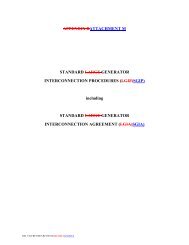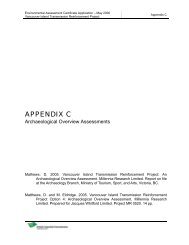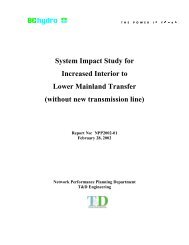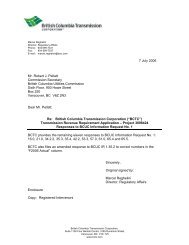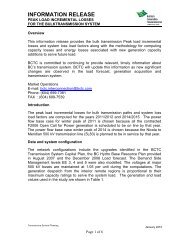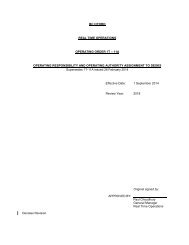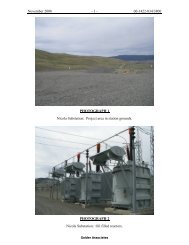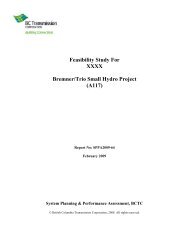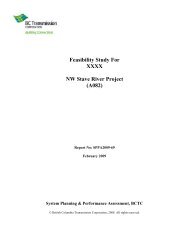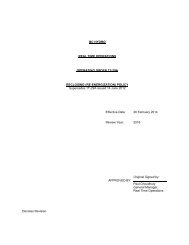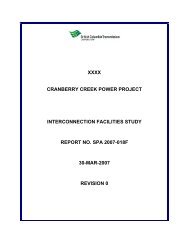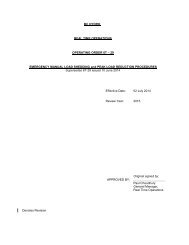Evidence on the Adequacy of First Nations Consultation - BC Hydro ...
Evidence on the Adequacy of First Nations Consultation - BC Hydro ...
Evidence on the Adequacy of First Nations Consultation - BC Hydro ...
You also want an ePaper? Increase the reach of your titles
YUMPU automatically turns print PDFs into web optimized ePapers that Google loves.
DRAFT REPORT: Rights and Title Interests in <strong>the</strong> Columbia Valley Transmissi<strong>on</strong> Project Area<br />
4.0 LINGUISTIC AND CULTURAL AFFILIATIONS OF THE<br />
CLAIMANT GROUPS<br />
The follow secti<strong>on</strong> examines <strong>the</strong> identity <strong>of</strong> <strong>the</strong> claimant groups and <strong>the</strong> territory that <strong>the</strong>y are<br />
said to have used and occupied in <strong>the</strong> historic period.<br />
4.1 Ktunaxa Linguistic and Ethnic Affiliati<strong>on</strong>s<br />
The “Ktunaxa” or Kutenai people speak <strong>the</strong> Kutenai language. Although “Ktunaxa” is now a<br />
widely-used popular term in British Columbia, most linguistic and ethnographic studies c<strong>on</strong>tinue<br />
to use <strong>the</strong> spelling “Kutenai” which is <strong>of</strong>ten spelled “Kootenai” in <strong>the</strong> United States. Ano<strong>the</strong>r<br />
spelling, “Kootenay,” appears in geographical names in British Columbia, and is widely known.<br />
There have been literally dozens <strong>of</strong> spellings <strong>of</strong> this term since it was first recorded in <strong>the</strong> early<br />
1800s.<br />
“Kutenai” is an anglicizati<strong>on</strong> <strong>of</strong> <strong>the</strong> term “kot<strong>on</strong>áwa,” a word said to be used by <strong>the</strong> Blackfoot to<br />
refer to <strong>the</strong> Kutenai people. Apparently <strong>the</strong> term “kot<strong>on</strong>áwa” is based <strong>on</strong> a root “kotóna-” which<br />
itself may ultimately be derived from <strong>the</strong> Kutenai word “ktunaxa/ “ (written as “Ktunaxa”).<br />
This term, “ktunaxa/ ”, as well as <strong>the</strong> term “ksanka” are <strong>the</strong> two words in <strong>the</strong> Kutenai language<br />
which are used to describe <strong>the</strong> Kutenai people as a whole, as well as <strong>the</strong> language. It is said that<br />
<strong>the</strong> M<strong>on</strong>tana Kutenai in particular use <strong>the</strong> word “ksanka” while o<strong>the</strong>r Kutenai people generally<br />
use <strong>the</strong> term “ktunaxa/ ”. 245 Similar informati<strong>on</strong> is provided by anthropologist Bill Brunt<strong>on</strong> who<br />
notes that <strong>the</strong> M<strong>on</strong>tana “Kootenai” (Kutenai) use <strong>the</strong> term “ksanka” for both “<strong>the</strong>mselves and for<br />
all Kootenais.” Brunt<strong>on</strong> states as well his view that “it is possible that ksanka originally applied<br />
<strong>on</strong>ly to <strong>the</strong> Lower Kootenai while ktunaxa applied to <strong>the</strong> Upper Kootenai” 246 (see below for <strong>the</strong><br />
distincti<strong>on</strong> between Upper and Lower Kutenai).<br />
Most linguists identify Kutenai as a “linguistic isolate” meaning that it is not related to any o<strong>the</strong>r<br />
known language. 247 At <strong>on</strong>e time, all <strong>the</strong> language families <strong>of</strong> <strong>the</strong> Northwest Coast and Plateau<br />
culture were classified into <strong>on</strong>e <strong>of</strong> three “phyla”—Na-Dene, Alg<strong>on</strong>kin-Wakashan and<br />
Penutian—although <strong>the</strong>se phyla are no l<strong>on</strong>ger accepted as valid by most linguists. Kutenai,<br />
245 Lawrence Morgan (1991). A Descripti<strong>on</strong> <strong>of</strong> <strong>the</strong> Kutenai Language. Unpublished Ph.D dissertati<strong>on</strong> in<br />
Linguistics. Department <strong>of</strong> Linguistics, University <strong>of</strong> California at Berkeley. Pp. 1-2.<br />
246 Bill B. Brunt<strong>on</strong> (1998). Kutenai. Handbook <strong>of</strong> North American Indians, Vol. 12, Plateau (ed. by Deward<br />
E. Walker Jr.). Smiths<strong>on</strong>ian Instituti<strong>on</strong>: Washingt<strong>on</strong> DC. Page 236.<br />
247 Dale Kinkade, William W. Elmendorf, Bruce Rigsby and Haruo Aoki (1998). Languages. Handbook <strong>of</strong><br />
North American Indians, Vol. 12, Plateau (ed. by Deward E. Walker Jr.). Smiths<strong>on</strong>ian Instituti<strong>on</strong>: Washingt<strong>on</strong> DC.<br />
Pp. 49-52.<br />
Bouchard & Kennedy Research C<strong>on</strong>sultants Page 59<br />
Page 62 <strong>of</strong> 200



